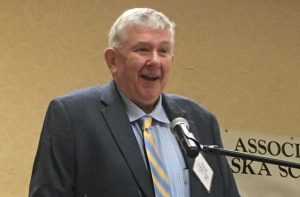Conduct and Ethics in a Charged Social Climate

By Norm Wooten
AASB Executive Director
I recently read an article from another state that detailed the misbehavior of an elected official and his subsequent removal from office and the trial that sent him to prison. While wondering what causes a person to betray public trust the thought occurred to me that it’s been quite some time since I reviewed AASB’s Board Standards.
The fifth board standard directly addresses the bad behavior committed by the person I was reading about:
CONDUCT & ETHICS
The board and its individual members conduct district business in a fair, respectful, and responsible manner.
This statement is significant in that both the board as a body as well as individual board members are expected to act in an ethical manner. Neither the board nor its members are given a bye for bad behavior. The Conduct and Ethics standard has three indicators. In the political and social media climate permeating our country it is worth reexamining them.
1. The board and its individual members act in a manner that reflects service to the community on behalf of students.
It behooves each one of us to remember that elective office is truly public service with an obligation to appropriately serve the electorate who placed us into office. Perhaps I’m biased but I believe school board service is the highest calling in which a person can serve. What greater legacy is there than to create good, responsible citizens prepared to take their place in society? As school board members we need to be mindful that we serve not only as governance officials but also as role models for our students. As we go about the business of school governance it is easy to become caught up in issues that only have minimal impact on student achievement. It is even more disturbing when adult problems take center stage. Unfortunately when this occurs “big people” issues tend to push “little people” issues to the side. Our obligation to communities, parents, and especially students is to be continually focused on the students attending our schools.
School Boards and board members also have statutory obligations as an elected body of the State of Alaska. Popularly known as the Open Meetings Act, Alaska Statute AS 44.62.310 describes the way public business must be conducted. The public must have access to public business and it must be conducted with the utmost transparency including timely notification of meetings and agendas. Only limited topics may be discussed out of view of the public (executive sessions). The law is specific on those topics and clear that any action must still be taken in public.
2. The Board demonstrates a commitment to continually improving teamwork, problem solving, and decision-making skills through a conscious program of board development.
This indicator succulently describes the manner in which a school board (or any elected body) should perform. Board members have a complex job. To effectively govern a school district board members should be constantly educating themselves. A highly effective board member ensures that every administrator, teacher, paraprofessional, and classified employees receive professional development appropriate to their job. Likewise, school board members should not neglect their own professional development. The majority of board members arrive on the board as lay persons – seldom do they have an educational background and yet they are expected to make decisions affecting student achievement by approving budgets, hiring a superintendent as the district’s educational leader, creating policies to guide the district, and approving curriculum. Board member professional development is essential!
Additionally, the Board is expected to work effectively together. In Alaska that means that five, seven, nine or eleven citizens of varied background and experiences must figure out a way to coalesce and work together to serve students. These individuals may be of different ethnicities, or cultures. They may be from widely disparate socio-economic groups. There may be members with PhD’s serving with a high school dropout. Every board member is equal with no individual authority and they must somehow learn how to interact, communicate, and work with one another for the good of their students. Communities expect no less from their school board.
3. Expenditures for board activities are clearly identified in the budget, related to the district vision, and open to public scrutiny.
Simply put, this indicator specifies that public money should be spent on public business – in the case of school boards for the benefit of students. A budget document should not be mysterious. It should be understandable and available to any member of the public. The budget creation process should be open and transparent and accomplished in the public eye. The budget should be tied to and support a long range or strategic plan. It must also be driven by student achievement data.
Any board of education expenditures should be grouped together and readily accessible to the public. The board should have a reasonable explanation for any funds spent on its members.
School board members should strive to always be above reproach and hold themselves to the highest ethical and behavioral standards. Our students deserve this from us.
# # #
